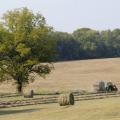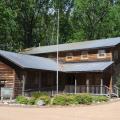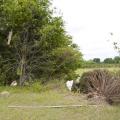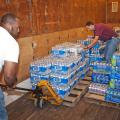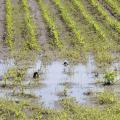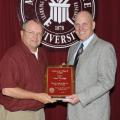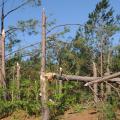Feature Story from 2011
Editors Note: The class scheduled for June 2 at the Prairie Research Unit was canceled on May 24 and will not be rescheduled.
MISSISSIPPI STATE – The Mississippi State University Extension Service will offer its annual spring grazing school to help livestock producers with their forage management practices.
MISSISSIPPI STATE – A museum showcasing the contributions of Mississippians who have participated in America’s largest youth organization is getting a high-tech renovation.
The Mississippi 4-H Learning Center and Pete Frierson Museum is undergoing a transformation of its exhibits, funded by a $120,000 grant from the Mississippi Land, Water and Timber Resources Board. As part of the larger Mississippi Agriculture and Forestry Museum, the 4-H learning center focuses on the connection between youth and agriculture.
By Lelia Scott Kelly
Consumer Horticulture Specialist, North Mississippi Research & Extension Center
MISSISSIPPI STATE – As Mississippians begin the process of rebuilding and cleaning up their tornado-ravaged landscapes, they should consider ways to make the process safer and easier.
Safety is the first consideration, so removing of any damaged trees or large limbs that pose a hazard to homes or people should come first. Hire a professional to do this if you cannot safely do the job.
MISSISSIPPI STATE – The cumulative effect of many individual bad choices can be as harmful to the water quality in an area as if a major disaster occurred.
Amy Schmidt, water quality specialist with the Mississippi State University Extension Service, said overfertilizing lawns and pouring chemicals into storm drains harm water quality. But dumping unneeded medicines and personal care products into the sewer system can be just as bad.
MISSISSIPPI STATE – The Mississippi State University Extension Service recently formalized a partnership with the Mississippi State University Small Business Development Center to enhance economic development opportunities for entrepreneurs across the state.
MISSISSIPPI STATE – April’s heavy rains have been devastating Mississippi’s agriculture, as they delay planting, postpone management and flood fields.
Heavy rains that accompanied the late-April storms added to already soggy soils and are pushing some planting dates dangerously late.
By Karen Templeton
MSU Ag Communications
MISSISSIPPI STATE – As heavy rainfall causes more flooding along the Mississippi River, residents in flood-prone areas may have to consider evacuation, and those with pets should have a plan of departure that includes their furry and feathered family members.
MISSISSIPPI STATE -- Three Mississippi Agricultural and Forestry Experiment Station faculty members were recently recognized for their significant contributions to their fields.
Peter Ryan, Mark Woodrey and Ramon Arancibia were honored at the MAFES and Mississippi State University’s College of Agriculture and Life Sciences annual spring meeting.
MISSISSIPPI STATE – Tornadoes that swept through Mississippi and much of the southeast April 27 caused an estimated $8.4 million of timber losses.
The Mississippi Forestry Commission compiled the estimate April 30 based on aerial surveys conducted after the storms. Russell Bozeman, director of forest protection and forest information with the commission, said the total affected area was about 26,240 acres. Of this, 15,564 were forested acres.
MISSISSIPPI STATE – Long before and long after tornadoes are on the ground, Mississippi State University Extension Service personnel are in position to lend a helping hand in every community impacted by a disaster.
Chickasaw County Extension director Scott Cagle is helping communities cope in the aftermath of two tornadoes: one that passed through around 3 a.m. on April 27 and the second, stronger tornado that followed a different path about 12 hours later.
MISSISSIPPI STATE – The Mississippi River is predicted to reach historic flood levels this spring, and families can help their children by planning together for potential evacuations.
Mississippi State University Extension Service experts advise parents to take steps to prepare their children physically and emotionally so they can better deal with the challenges of being displaced from home.
MISSISSIPPI STATE – Mississippi State University will host two dairy field days June 28 and 29 to meet the educational needs of dairy producers in the state.
The 2011 MSU North Mississippi Dairy Field Day will be held June 28 in Verona at the North Mississippi Research and Extension Center. The 2011 MSU South Mississippi Dairy Field Day will be held June 29 in Tylertown at the Southwest Events Center Indoor Conference Facility.
MISSISSIPPI STATE – Children displaced by natural disasters have unique needs, and the Mississippi State University Extension Service has trained key personnel to set up child-friendly spaces in evacuation shelters.
Melissa Tenhet, project director for the Mississippi Child Care Resource & Referral Network, said emergency responders will help affected communities provide safe, fun and educational activities at shelters. Her staff has been trained in the Child-Friendly Spaces Program and the Incident Management System.
MISSISSIPPI STATE – When floodwaters recede, Mississippians in affected areas should take steps to reduce exposure to mosquitoes and the diseases they may carry.
Jerome Goddard, medical and veterinary entomologist with the Mississippi State University Extension Service, advises a common-sense approach to mosquito population control and encourages people to protect themselves from mosquito bites.
MISSISSIPPI STATE – Farmers in the path of the cresting Mississippi River floodwaters should take precautions to minimize effects of the flood, and high on that list is moving farm chemicals out of harm’s way.
The Mississippi Department of Environmental Quality is urging farmers, homeowners and those whose businesses deal with chemicals to beware of environmental issues that can result if flooding reaches them. Among the farm chemicals that should be moved are herbicides, pesticides, fertilizers, fuels and treated seeds.
MISSISSIPPI STATE – The growing season is blooming early for William Tucker, a fruit and vegetable producer participating in a grant-funded research program studying high tunnel use.
High tunnels, also called “hoop houses,” are unheated greenhouses that allow producers to extend the growing season. These structures insulate plants from cooler spring and fall temperatures by trapping warmer air inside a frame structure covered in plastic sheeting.
By Karen Templeton
MSU Ag Communications
MISSISSIPPI STATE – As the Mississippi River continues to rise, those who keep cattle in Delta floodplains need to prepare to move them to higher ground.
Before evacuating, owners need to ensure their cattle are uniquely and permanently identified. Proper identification will be needed to prove ownership and to reclaim cattle before returning home.
MISSISSIPPI STATE – A Mississippi State University professor with more than 20 years of experience is the new director of the school of human sciences.
Since 2004, Michael Newman has served as a professor in agricultural information science and education as well as a specialist for the MSU Extension Service.
MISSISSIPPI STATE – Mississippi KIDS COUNT is seeking nominations for the annual Success Story campaign, which highlights the work of organizations that improve the lives of children and families across the state.
Housed at Mississippi State University, Mississippi KIDS COUNT works to improve the lives of the state’s families by providing information to policymakers, educators, program administrators, parents, advocates and the general public. KIDS COUNT recognizes organizations that are providing a helping hand to Mississippi’s children.
Pages
Feature Story Archive
- 2025 (64)
- 2024 (116)
- 2023 (114)
- 2022 (112)
- 2021 (104)
- 2020 (140)
- 2019 (126)
- 2018 (141)
- 2017 (197)
- 2016 (240)
- 2015 (319)
- 2014 (355)
- 2013 (371)
- 2012 (343)
- 2011 (246)
- 2010 (236)
- 2009 (229)
- 2008 (188)
- 2007 (210)
- 2006 (199)
- 2005 (224)
- 2004 (215)
- 2003 (228)
- 2002 (176)
- 2001 (184)
- 2000 (188)
- 1999 (180)
- 1998 (178)
- 1997 (188)
- 1996 (58)
- 1995 (36)

